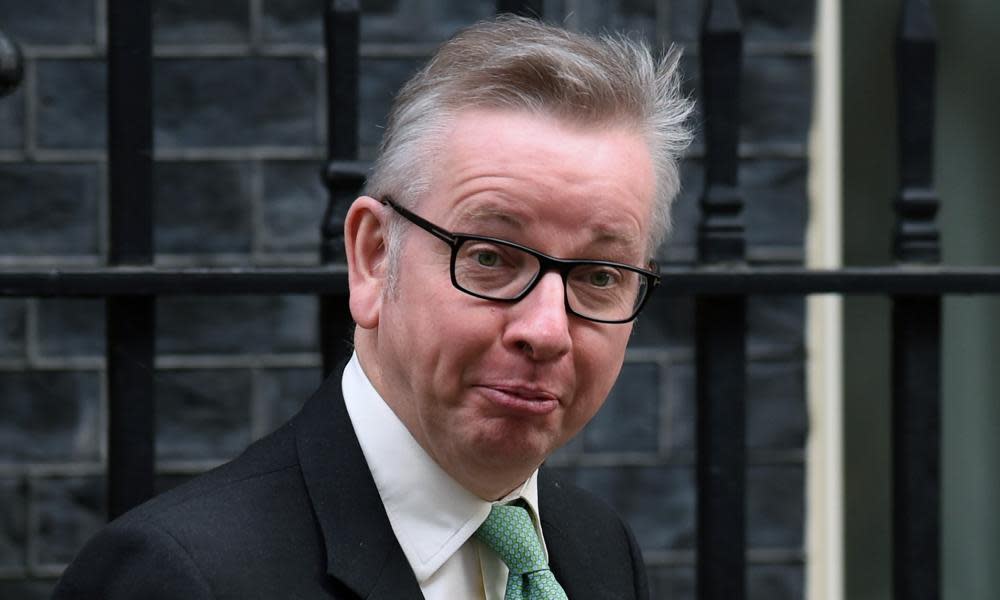Gove says UK law will specifically recognise animal sentience

Michael Gove has promised to make “any necessary changes” to UK law to recognise that animals can feel pain, after a social media campaign accused Conservative MPs of voting down proposals to accept they are sentient beings.
The environment secretary issued a statement to the House of Commons insisting that it was a misconception to say Tory MPs voted against the idea that animals are sentient and feel pain.
But he clarified that the government was now looking at making UK law specifically recognise animal sentience, following a row over the issue in the EU withdrawal bill.
“The prime minister has made clear that we will strengthen our animal welfare rules,” he said in in a written statement to MPs. “This government will ensure that any necessary changes required to UK law are made in a rigorous and comprehensive way to ensure animal sentience is recognised after we leave the EU.
“The withdrawal bill is not the right place to address this; however, we are considering the right legislative vehicle.”
Gove also hinted that the UK could pursue tougher animal welfare rules after Brexit, including a ban on live animal exports and crackdown on puppy smuggling. He claimed EU rules currently prevented the government from imposing such restrictions.
The furore erupted after the government rejected an amendment to the EU withdrawal bill from Caroline Lucas, the Green MP, which would have transposed a part of the Lisbon treaty into UK law to explicitly recognise that animals were sentient lifeforms.
Ministers insisted animals were protected under the Animal Welfare Act, which does not specifically mention sentience, but contains safeguards regarding animals in distress.
But Gove was forced to act after social media campaigns by 38 Degrees, Compassion in World Farming, and other groups targeted Conservative MPs, calling on them to reverse their vote against recognising animal sentience.
In his statement, the environment secretary claimed the EU instrument that Lucas wanted to transpose “does not have direct effect in law –[and] in practice its effect is very unclear and it has failed to prevent practices across the EU which are cruel and painful to animals”.
What is the EU withdrawal bill?
The EU Withdrawal Bill – once known as the Great Repeal Bill – is going through the House of Commons to repeal the 1972 European Communities Act and transpose all existing EU legislation into domestic UK law, which will avoid a 'cliff-edge' change on the day after we leave the EU.
Parts of the bill have been highly controversial, and MPs have tabled hundreds of amendments to try and change its wording, including a significant number of Conservative rebels. Some of the key controversies include its use of so-called Henry VIII powers, which will give government ministers the power to tweak the wording of laws to make sure they make sense in UK legislation - but those changes could take place without having to go through parliament. MPs have called this a "power grab" by the government. The government estimates around 800 to 1,000 measures called statutory instruments will be required to make sure the bill is applied correctly.
Other concerns include the government's decision not to include the EU charter of fundamental rights in the law being transposed. Other amendments are attempts to affect the Brexit process, including legislating for a transitional period and giving MPs a binding meaningful vote on the deal secured by Theresa May, before the deal is finalised.
However, Lucas was not satisfied by Gove’s statement, saying it was “silly”. She tweeted it was “amazing to see so many animal lovers taking action in support of my animal sentience amendment”.
“If the EU withdrawal bill isn’t the right place to transfer EU law into UK law, then what is?” she said.
Lucas added: “The government’s refusal to accept this amendment is simply absurd - and their continued insistence that sentience is covered in animal legislation is wrong. Britain been forward thinking animal welfare over the years, which is why ditching this provision would be such a backwards step. The UK government led on introducing this EU protocol in the first place, and it’s only an obsession with refusing changes to the EU withdrawal bill that’s stopping ministers adopting this amendment now.
“The animal sentience protocol is important because it is an instruction to future governments when creating legislation - and it should be the basis of future lawmaking on animal welfare in Britain.”
Since the debate, Conservative MPs have been bombarded with emails and social media activity criticising their presumed belief that animals are not sentient.
Zac Goldsmith, the environmentally minded MP for Richmond Park, tweeted that some of the reporting had been “weird and dishonest”, and argued the vote had been about the correct legal procedure for ensuring animal welfare standards, not on the principle of whether animals are sentient.
Fellow Conservative Rachel Maclean, the MP for Redditch, branded the campaigns “fake news”, stating that: “This government, and in fact all governments, are deeply committed to continuing to protect animals as sentient beings. That law is already written into our own law.”
Campaign groups have urged MPs to support other chances to amend the EU withdrawal bill to ensure animal sentience is recognised later in the passage of the legislation, which will create a further headache for the government.
The Conservatives were taken by surprise during the election at the scale and depth of feeling about animal rights issues, after the party said it would hold a free vote on foxhunting and did not include promises about banning ivory sales in its manifesto. The government has since dropped the idea of reopening the foxhunting debate and banned the ivory trade, regardless of the age of items.

 Yahoo News
Yahoo News 
